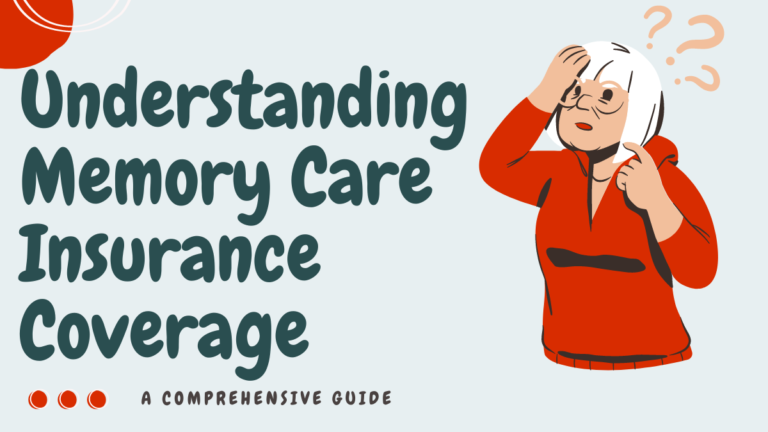Is Assisted Living Covered by Long Term Care Insurance?

Are you worried about finding the right coverage for your future assisted living needs? Long term care insurance might just hold the key to your worries. But, wait! Does it actually cover all aspects of assisted living that you need? Join us as we unravel the mysteries of long term care insurance and determine if it truly provides comprehensive coverage for your evolving healthcare requirements. Don’t miss out on this enlightening journey to decode the real benefits behind this frequently misunderstood form of insurance!
Table of Contents
Introduction to Long Term Care Insurance
Long term care insurance (LTCI) is designed to help policyholders pay for the costs of extended care, which can include assisted living. LTCI policies generally cover a range of services, from in-home health care to nursing home stays.

While LTCI can be a helpful way to offset the costs of assisted living, it’s important to understand that coverage varies widely from policy to policy. Some policies may only cover a certain number of days or dollars of care, while others may have more comprehensive coverage. It’s also important to know that most LTCI policies require that policyholders meet certain eligibility criteria, such as being unable to perform two or more activities of daily living (ADLs).
If you’re considering purchasing an LTCI policy, be sure to do your research and compare policies carefully to find one that best meets your needs. You may also want to consult with an experienced insurance agent or financial advisor who can help you understand your options and make the best decision for your unique circumstances.
What Does Long Term Care Insurance Cover?
There is a lot of confusion out there about what long-term care insurance actually covers. Most people believe that it will cover the cost of assisted living, but that is not always the case. Long-term care insurance is designed to cover the costs of extended medical care, which can include assisted living, but it is not guaranteed.
Assisted living is considered a form of long-term care, but it is not always covered by long-term care insurance policies. Coverage varies from policy to policy, so it is important to read the fine print before purchasing a policy. Some policies will only cover certain types of assisted living facilities, while others may not cover them at all.
If you are considering purchasing a long-term care insurance policy, be sure to ask about coverage for assisted living. It is important to know exactly what your policy covers so that you can make an informed decision about whether or not it is right for you.
Who Qualifies for LTC Benefits?
To qualify for long-term care benefits, a policyholder must be:
- Unable to perform at least two activities of daily living (ADLs) without assistance, or
- Have a cognitive impairment, as certified by a licensed health care professional.
Activities of daily living include: bathing, dressing, eating, using the toilet, transferring (e.g., from a bed to a chair), and walking. A policyholder does not have to be completely unable to perform an ADL to qualify for benefits; needing substantial assistance or being unable to perform an ADL on his or her own receive benefits.
Cognitive impairments can include Alzheimer’s disease, dementia, and other conditions that affect memory and cognitive function.
Is Assisted Living Covered by LTC Insurance?
Assisted living is a type of long-term care that helps seniors with activities of daily living, such as bathing, dressing, and eating. It also provides social and recreational activities in a community setting.
Most long-term care insurance policies will cover assisted living expenses. However, it is important to check with your insurer to see what is included in your policy. Some policies may have exclusions or limitations on coverage for assisted living.
Should You Buy LTC Insurance?
There’s no easy answer when it comes to whether or not you should buy long-term care (LTC) insurance. Ultimately, it depends on your unique circumstances and needs.
For some people, LTC insurance can be a valuable safety net that helps cover the costs of assisted living or other long-term care services. But for others, it may not be worth the investment.
Here are a few things to consider when making the decision about whether or not to purchase LTC insurance:
- Your current health and age: If you’re young and healthy, you’re less likely to need long-term care services. And if you do need them, your health insurance may cover some of the costs. As you get older, your chances of needing long-term care increase. That’s why many experts recommend buying LTC insurance when you’re younger and in good health.
- Your assets and income: If you have significant assets (like a home or investments), you may be able to pay for long-term care out of pocket without depleting your savings. On the other hand, if you don’t have many assets, LTC insurance can help make sure you can afford the care you need without putting a financial strain on your loved ones.
- Your family history: If your parents or grandparents needed long-term care, you may be more likely to need it as well. Knowing your family history can help give you an idea of your own risk factors .
- Your estate planning goals: If you’d like to leave an inheritance for your heirs, you might need to factor the cost of long-term care into your plans. LTC insurance can help reduce the financial burden your loved ones may face if you require care.
It’s important to compare policies and costs carefully when deciding if long-term care insurance is right for you. Talk to a qualified financial planner or insurance agent who can answer your questions and help you find the best policy to fit your budget and needs.
Alternatives to LTC Insurance
There are a few alternatives to long-term care insurance, though they may not be right for everyone. One option is to self-insure, which means setting aside money each month to cover future care costs. This can work if you have a good handle on your finances and are disciplined about saving, but it’s not for everyone.
Another option is to purchase an annuity, which can give you a stream of income to help cover care costs. This option comes with some risk, as annuities can be volatile, so be sure to do your research before purchasing one. You could consider Medicaid, which offers long-term care coverage for those who qualify. Each option has its own set of pros and cons, so be sure to weigh all your options before making a decision.

Conclusion
Long-term care insurance is an important and beneficial form of coverage, but it’s not a one size fits all solution. It’s important to do your research and determine whether or not long-term care insurance will cover the type of care that you need. From there, you can decide if this form of insurance is the right choice for you.
With a better understanding of what long-term care insurance covers and does not cover, it can be easier to make an informed decision about whether to buy a policy in order to protect yourself from future expenses associated with assisted living.






